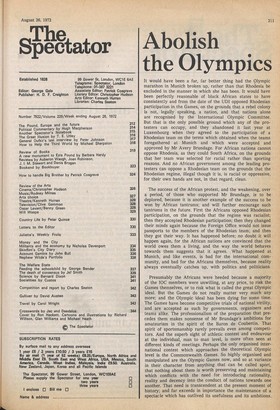Abolish the Olympics
It would have been a far, far better thing had the Olympic marathon in Munich broken up, rather than that Rhodesia be excluded in the manner in which she has been. It would have been perfectly reasonable of black African states to have consistently and from the date of the UDI opposed Rhodesian participation in the Games, on the grounds that a rebel colony is not, legally speaking, a nation, and that nations alone are recognised by the International Olympic Committee. But that is the only possible ground which any of the protesters can occupy, and they abandoned it last year at Luxembourg when they agreed to the participation of a Rhodesian team on the terms which obtained when the teams foregathered at Munich and which were accepted and approved by Mr Avery Brundage. For African nations cannot oppose Rhodesia, as they could South Africa, on the grounds that her team was selected for racial rather than sporting reasons. And no African government among the leading protesters can oppose a Rhodesian team on the grounds that the Rhodesian regime, illegal though it is, is racial or oppressive, for their own hands are not, in that regard, clean.
The success of the African protest, and the weakening, over a period, of those who supported Mr Brundage, is to be deplored, because it is another example of the success to be won by African tantrums; and will further encourage such tantrums in the future. First the Africans opposed Rhodesian participation, on the grounds that the regime was racialist; then they accepted Rhodesian participation; then they changed their minds again because the Foreign Office would not issue passports to the members of the Rhodesian team; and then they got their way. It has happened before; no doubt it will happen again, for the African nations are convinced that the world owes them a living, and the way the world behaves towards them suggests that it agrees. What happened at Munich, and like events, is bad for the international community, and bad for the Africans themselves, because reality always eventually catches up, with politics and politicians.
Presumably the Africans were heeded because a majority of the IOC members were unwilling, at any price, to risk the Games themselves, or to risk what is called the great Olympic ideal. But the Games do not really matter very much any more; and the Olympic ideal has been dying for some time. The Games have become competitive trials of national virility, and are accepted as such by governments, organisers and teams alike. The professionalism of the preparation that precedes them makes nonsense of Mr Brundage's ambitions for amateurism in the spirit of the Baron de Coubertin. That spirit of sportsmanship rarely prevails even among competitors. And the superb sight of athletic contest and endeavour at the individual, man to man level, is more often seen at different kinds of meetings. Perhaps the only organised international contest which approaches the theoretical Olympic level is the Commonwealth Games. So highly organised and manipulated are the Olympic Games now, and so at variance in their character from anything that can be called sport, that nothing about them is worth preserving and maintaining which conflicts with the need for introducing rationality, reality and decency into the conduct of nations towards one another. That need is transcendent at the present moment of history; and far exceeds in importance the maintenance of a spectacle which has outlived its usefulness and its ambitions.










































 Previous page
Previous page